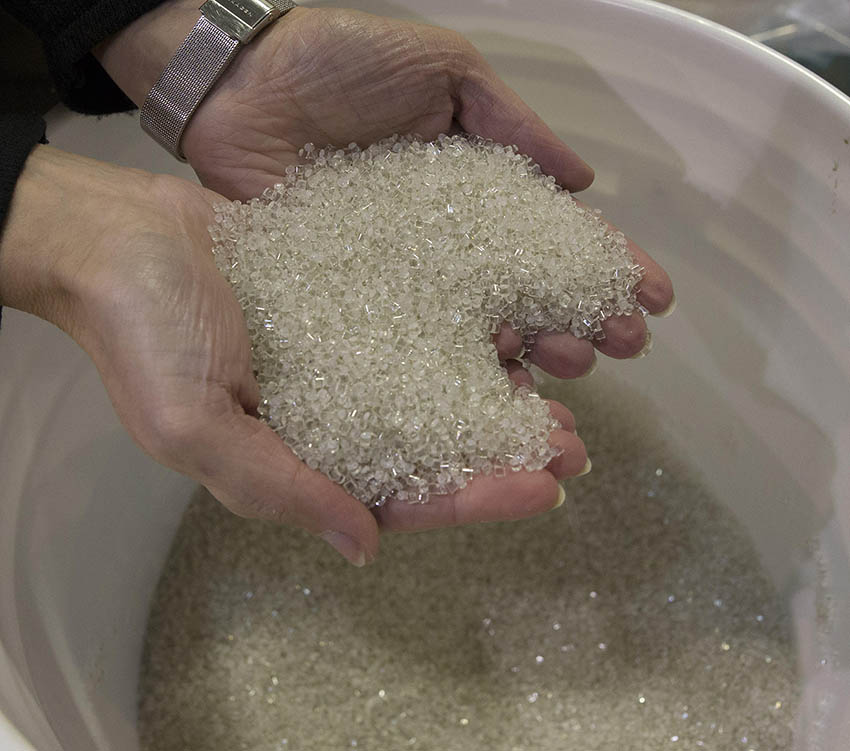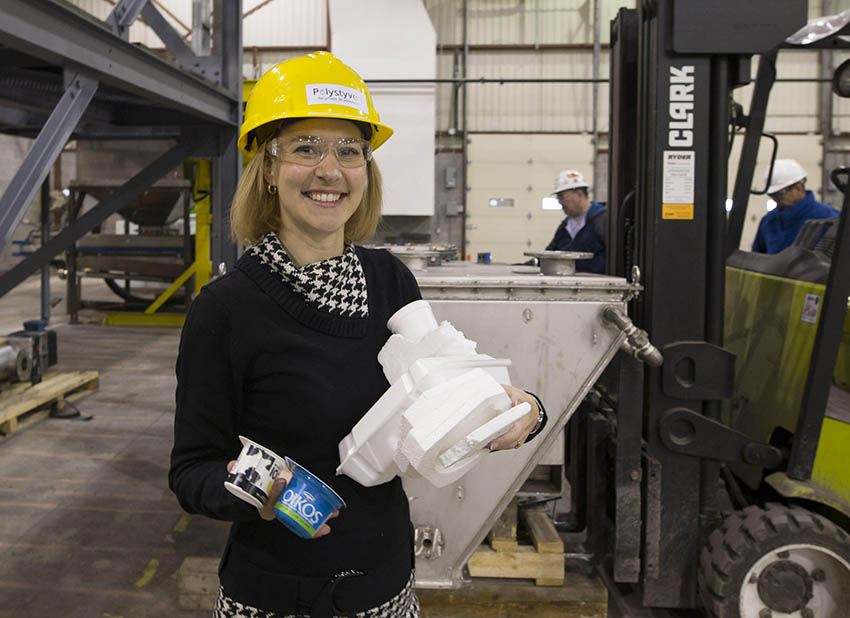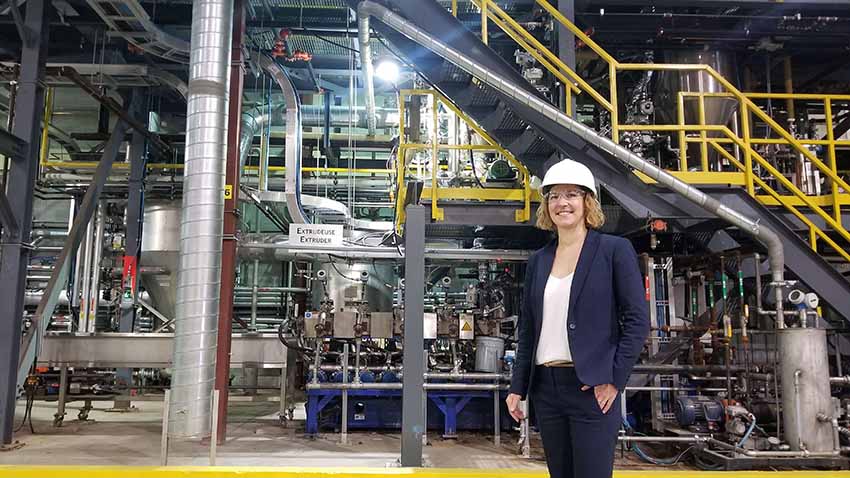Founded in 2011, Polystyvert is a Montreal-based clean technology company that has developed an innovative, low-carbon-footprint process to recycle polystyrene based on a dissolution technology offering the shortest loop to recycle polystyrene and establish a circular economy. Effective on all types of polystyrene, Polystyvert’s technology includes a purification process that removes contaminants. This purification process has a high yield and a unique system that can purify the highest contaminated material/product to regenerate the polystyrene into virgin-like resin. This resin can then be reused for food grade. The result is a high purity recycled resource that can be reused for upcycled polystyrene products, opening the door to a larger market than actual mechanical recycling technologies.
Since large quantities of post-consumer or post-industrial polystyrene waste are buried in landfills every year, Polystyvert’s patented technology addresses a major global environmental issue, while more and more new polystyrene is produced. Polystyvert’s technology offers a great opportunity to reduce the consumption of fossil fuels used in the production of new polystyrene and reduce GHG emissions.
Polystyvert’s patented technology offers a great opportunity to reduce the consumption of fossil fuels used to produce new polystyrene and reduce GHG emissions.
The company is now commercializing its technology through licensing, and already established partnerships with many producers such as Bewi and Inéos.
Interview with Camille Creusot, Administration and Communication Assistant at Polystyvert Inc

Easy Engineering: What are the main areas of activity of the company?
Camille Creusot: Polystyvert internally developed the full process and intellectual property of its technology.
Polystyvert already has filled 3 families of patents around the world and is currently working on several more: recycling PS with p-cymene, recycling PS with ethylbenzene and a purification process.
The company specialized in developing a thorough purification technology for recycling polystyrene. More specifically, we found a way to recycle by dissolving any styrene-based plastic (GPPS, EPS, XPS, SBS, HIPS,) and we are currently adapting this technology for SAN and ABS.
ABS is quite different as it is a terpolymer made of acrylonitrile, butadiene and styrene and is often highly contaminated which makes it harder to recycle.
Throughout the adaptation of ABS, the market we are aiming at is becoming even bigger as many over-consumed products and technologies on the current market are made of ABS – such as phones, car parts, Lego toys.
Once purified, these final products have the same mechanical properties as its virgin counterparts; however, they incorporate a substantive amount of recycled material.
Nevertheless, Polystyvert is on the verge of building its first commercial polystyrene recycling plant in North America.

E.E: What’s the news about new products?
C.C: What is new about our product and generation is that recycling is getting more and more important and so even more in demand. The change and impact we are trying to have on the environment is getting even more reachable thanks to the customers who are getting more careful about their environmental impact and value recycled products. Moreover, the rise of corporate responsibility is making our market grow bigger, and the scope of our actions as well.
Moreover, what is new about our product, but also about recycled PS and plastic in general, is that Polystyvert recently received the food grade certification from Intertek. Our process was approved and allows us to reuse our recycled material and use it to make food packaging making it food-contact safe.
With the development of this innovative, low-carbon-footprint process resulting in a high purity recycled resource. The recycled product will be reused for upcycled polystyrene products. This is opening the door to a larger and more sustainable market than actual mechanical recycling technologies, reducing GHG emissions by 75%.
E.E: What are the ranges of products?
C.C: Polystyvert specializes in recycling styrene-based plastic by dissolving it in an essential oil (p-cymene) just like sugar in a cup of coffee. Since other plastics and contaminants – such as graphite, pigment, and other additives, do not dissolve in the solvent it makes it is very efficient to remove everything and purify the PS. The final step is a PS paste which is then devolatilized to obtain pellets. Those pellets that are basically virgin-like resin of polystyrene that can be reused in circular economy to make any new PS product – such as insulation panels, food containing, yogurt cups, expensed PS etc.
E.E: At what stage is the market where you are currently active?
C.C: Polystyvert’s market is at maturity stage in North America. However, in Asia, it is still a growing market as the continent became such huge manufacturers in the past decade.
Also, for example, the ABS and PS recycled market is in a huge growing phase as the regulations keep increasing while phones, isolator and toys are more and more in demand throughout the world.
On the contrary, the PS recycling is considered the current “cash cow” of the market as it is very demanding and a solution must be found as more and more polystyrene waste are buried in landfills every year, while more and more new polystyrene is produced. Polystyvert’s patented technology addresses this particular and major global environmental issue which needs to be solved.

E.E: What can you tell us about market trends?
C.C: The trend of the recycled plastics market is constantly growing, and this growth will keep increasing in the coming years. Consumers are asking for more and more recycled products, which is pushing manufacturers to change the way they work. They design products with a recycled agreed and manage their products’ end of life. Regulations are also expanding. Governments required recycled content and an end-of-life management of products.
Even though the polystyrene market is a mature market, the fact that products need to be recycled is generating new growth in this market.
E.E: What estimations do you have for 2022?
C.C: 2022 is a big year for Polystyvert and marks a turning-point for the future of our company. We are, in fact, currently working on building a commercial plant.
We are currently operating on a demonstration plant with a 125kg generating capacity.
Our next step would be the commercial plant. We are currently looking for a plot where to build this new factory as we are almost done conceptualizing the engineering part.
The polystyrene commercial plant based in Montreal will be operational by 2024.
However, since the composition of ABS is more complicated, we are still adapting the technology for it and are not as advanced as we are for the PS technology.
In 2022, we are planning on building a recycling pilot plant to recycle ABS.

